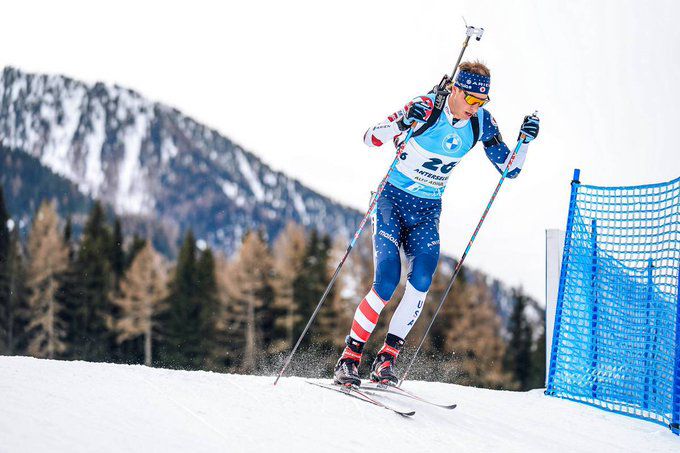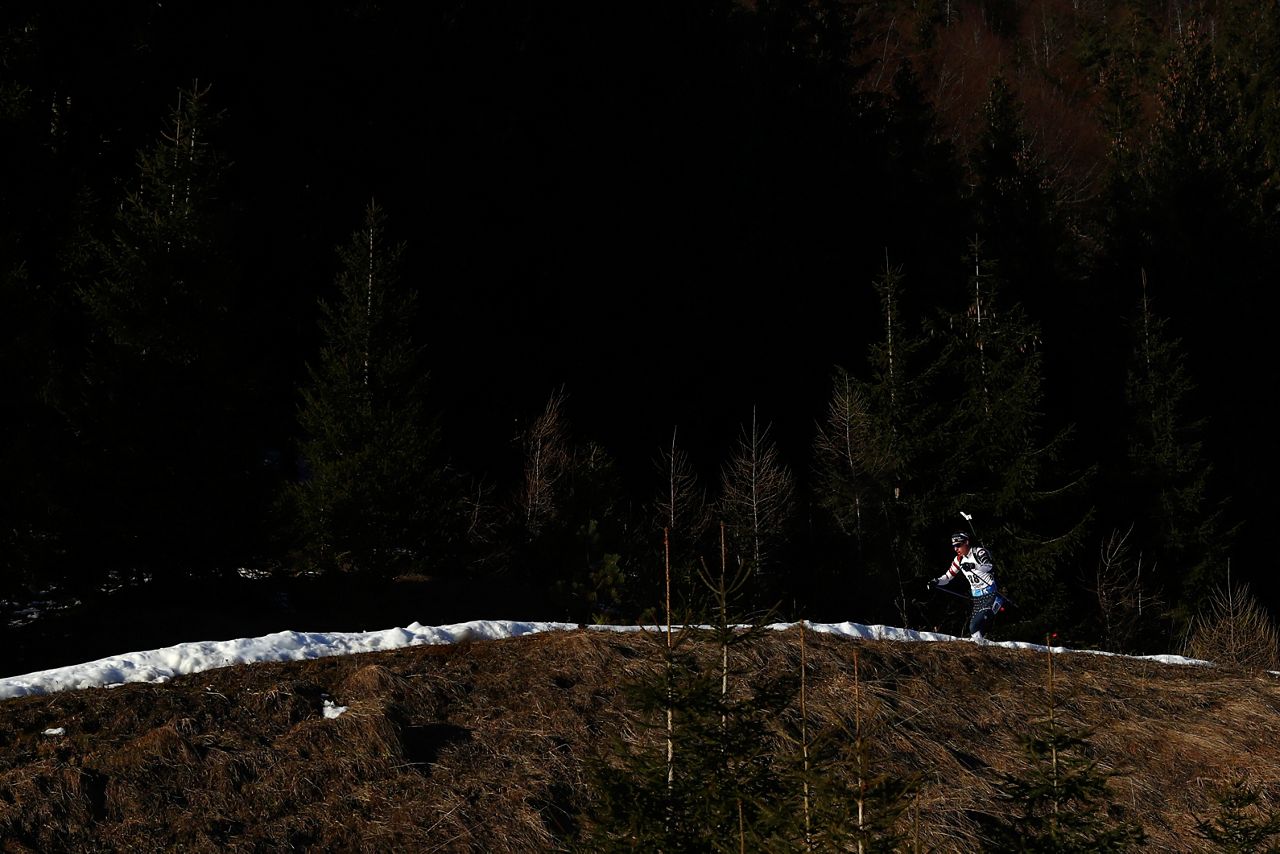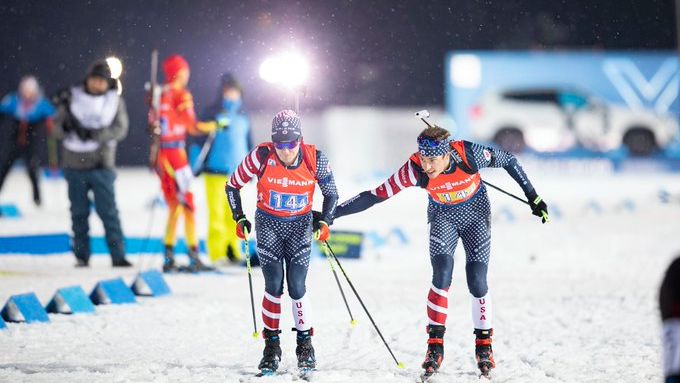APPLETON — Jim Keller had just visited his mailbox to collect the daily offerings when, as he began to flip through the letters, one caught his eye.
What You Need To Know
- Biathlon combines two sports – cross-country skiing and shooting – into one race. Athletes race around a closed course carrying a rifle strapped to their backs, and stop at designated spots to shoot at a series of targets.
- For every target missed, the athlete is penalized. Depending on the format, the penalty can be one lap around a 150m loop, or a one-minute penalty added on to their time.
- Schommer is guaranteed to race in three events: Men's 20km Individual (Feb. 8), Men's 12km Sprint (Feb. 12) and Men's 4x7.5km Relay (Feb. 15)
- Depending on coaches' decisions and his results in his three races in Beijing, Schommer could partake in up to three more races.
So he headed inside, settled into his favorite chair, opened it, read through it, and promptly put it back down on the end table. And there it stayed, for weeks.
“I said to myself, ‘Do I need another project?’’’ said Keller.
Paul Schommer, the author of that letter, would indeed be considered a project. Always has. And at this time, he was seeking financial support in his quest to become a world-class biathlon skier.
Now even the thought of that — world-class athlete — leads Schommer to a wry smile. Back in middle school, he was convinced he would be most happy if athletics would be his identity. So that day when he gazed at the weightlifters’ names and results on the board near the gym, he figured if he could drop a few pounds — pounds his body did not need to lose — he could get his name in a place that would make others see him as special.
“That was the first opportunity I felt I had to distinguish myself as an athlete among my peers,’’ said Schommer, who was also on the school wrestling team.
So he began to eat less and work out more which, on the surface, seemed rather harmless.
“And it just kind of turned into this addiction that blossomed into something I never expected,’’ Schommer said.
In a matter of weeks, 14-year-old Paul Schommer had become anorexic.
****
Moms being moms, blessed with that singular intuition, Doris Schommer knew something was amiss.
But sometimes, even those signals can become distorted.
“I just couldn’t pin it down,’’ she said.
As for Paul, his plans on becoming an athletic success weren’t exactly coming together. His body was changing, but not for the better. And as far as results in the athletic arena, there weren’t any.
“I could feel the difference,’’ said Schommer. “I was just slowly starting to enjoy things less. I didn’t have energy. I was always cold.’’
He recalls a health class where his teacher presented a discussion on food choices, and encouraged his students to eat less processed foods and unhealthy fats, and more whole foods. It made sense to Schommer, so he chose that path. Sometime later there was another class discussion, this time about eating disorders, and fear overtook his mind and body.
So he approached his teacher after class.

“I said, ‘Hey, I’m kind of doing this and, I don’t know, I’m not like … I don’t have an eating disorder or anything, do I?’ said Schommer.
“And, I mean, I was kind of freaked out about it. I was like, ‘I don’t want to be one of these people.’ One, because eating disorders were not healthy, but also the stigma that was attached to it, especially in males.”
This was an illness Schommer was constantly trying to hide. Yet he knew something was wrong, so he went to his mom and asked if she could arrange a physical with a doctor.
“It was kind of like a cry for help in its own way,’’ he said. “And so, my mom took me to the doctor and I remember stepping on the scale and seeing see my weight, and knowing what my weight was that spring in wrestling, and also for this weightlifting competition, and something broke inside me. I was like, ‘How did I even get here?’ It was a shock to me, knowing how much weight I had lost.’’
That summer, as Schommer continued to struggle with anorexia, the relationship between him and his father became strained.
“It was a difficult time,’’ he said, “because I was kind of embarrassed with some of it and I think my dad, he just like really struggled to understand it. You know, it's like you have your teenage son and he doesn't want to eat and everybody else's teenage son just wants to eat everything and can't get enough. And so, it was definitely, like, a really difficult time in our relationship as well.’’
Then came the day his father was going to work when his vehicle was struck head on by a car that crossed the center line because the driver, new to the third shift, had fallen asleep behind the wheel. His father was killed.
“It was kind of like right in the middle of it all,’’ said Schommer, “which is something that I definitely have had to deal with after the fact. To kind of, like, reconcile that like, ‘Hey, I didn't have the best relationship with my dad because I was like really stuck in these different ways.’ And he didn't really know how to react to these things. And it was because he loved me. It wasn't because he didn't care. Like he cared so much that he, you know, the frustration came out in like a really hard way. But yeah, I mean, it was definitely, definitely a hard time.’’
****
Freshman year of high school can be a scary time. And Paul Schommer walked into Kimberly High School every day a frightened young teen, desperately trying to keep his anorexia a secret from his classmates.
Like every kid, he wanted acceptance. But if his secret got out, he knew rejection was on its way.
Yet he was pushing back on going for treatment. He felt he could do it on his own until he realized he couldn’t.
He told his friends he had a heart problem, then checked into the Rogers center in Oconomowoc for nearly three months.
Doris said her son religiously followed all the treatments given to him at the Rogers center, and continued to stay on track when he was released.
“Obviously, we all want quick results and things like that to go away,’’ said Doris. “But in his case, it took many years for him to fully recover from that. And it just takes time. It took time. And that is what you had to allow him to do. And just to be there and support him along the way.”
Schommer said his final two years of high school were far better. Athletically, he finally found his niche when he joined a school-sponsored cross-country ski club.
“I think as a wrestler, there was a part of me that really loved being outdoors in the winter, instead of in this sweaty gym for hours with parents that are yelling,’’ Schommer said. “I think that was the one thing that really drew me to it.’’
And from the moment he put his first pole in the snow, he loved it.
“I can’t put a finger on exactly what it was,’’ he said. “But I think it was just pure. There was this pureness to it.’’
He not only loved the sport, he excelled, qualifying for a national competition his senior year. And it was there, in Maine, where he was introduced to the biathlon.
“It was fun, but I really didn’t think much of it because it was such a foreign sport,’’ he said.

He would go on to St. Scholastica College in Duluth, Minn., joined the cross-country ski team and found a coach in Chad Salmela, a former biathlete himself, who took Schommer under his wing and taught him what it meant to be a biathlete.
“Really, it was his willingness to help me out,’’ said Schommer. “That's what made a difference for me. Because before that, it was like this insurmountable obstacle to get to that point to like even try it. Whereas, you know, with him, he could help guide me, like, he believed in me. He could help me and kind of guide me to where I needed to be in order to even just give it a try.’’
So he tried, and slowly but steadily progressed. He was gaining both confidence and stature, but any ideas of advancing in the sport were drying up as fast as his money. So that’s when he wrote to Jim Keller.
“Here I am pushing 70 years old and I’m going, ‘Do I really wanted to get involved in this?’’’ said Keller.
The Neenah businessman, vice chairman and treasurer at J.J. Keller & Associates, is not one of those guys who scratches his name on a check, pats you on the back and walks away. He is along for the ride.
So while that letter collected dust at his home, the urge to open it, read it again, and contemplate what this might mean eventually won the day.
“I said, ‘Man, I gotta meet this kid,’’’ said Keller. “I thought God was putting him in my life for a reason. So I called him up. We had a meeting, and we hit it off. I liked him for the first time I met him. I saw some potential in him.’’
And it wasn’t long before he was back on his skis.
“Up until then I was living on a prayer,’’ said Schommer, “and it was an answered prayer to meet Jim.’’
****
When the announcement dropped, Schommer was fast asleep in his bed in France.
The life-changing news he had hoped to give his family was, instead, intercepted by his mom. Blame Facebook.
“Somebody posted it and I was like, ‘Oh my God, there it is,”’ she said.
Her son had qualified for the U.S. Olympic Men’s Biathlon team. He was going to be an Olympian.
“I think, you know, people would think that it was this huge endorphin high or something, but it really at the time I was just like, ‘Awesome. Now the real work begins,’’’ said Schommer. “Because I don't want to just go to the Olympics to like get my USA jacket and walk in the Opening Ceremony. I want to go there to compete and represent our country. And so, I think, it brought this sense of purpose like, ‘Hey, I'm going there for a reason.’ And it kind of was like this question of, ‘Well, what is that reason?’’’
He quickly found his answer.
“It was extreme gratitude,’’ he said. “Very thankful for it. I mean, I thought of all the people that helped get me to that point, but also just made me also want to do my very best for those same people. Because, I mean, there's been so many people that have helped me and believed in me even when I haven't believed in myself. And it really makes me want to just do well for them.’’
He started the World Cup season with his best finish ever, coming in 22nd place. Then last weekend in Oslo, Norway, he cracked the top 10, finishing ninth.
“Which is my best result again, by 13 places,’’ said Schommer. “So that is something that was kind of a surprise. It's a very welcome surprise to take top 10 on the World Cup. That's not something I was really expecting but, you know, to do it right before the Olympics … In some ways it is extremely exciting because it's like, 'Wow, I'm kind of knocking on the door of that podium.'’’
Ah yes, the podium, an undiscovered territory for the U.S. Olympic Men’s Biathlon team. No American man has ever set foot on it, so it will be the story surrounding the team.
****
Paul Schommer has allowed himself to dream of late. An Olympic medal? For a guy who desperately wanted to be a jock in high school, but couldn’t even make any varsity team.
“I would be kind of floored by it,’’ he said.
But medal or not, in truth, victory is already in hand.
“Yeah, that's something I've thought about a lot,’’ he said. “I mean, just, like, where I am today compared to, like, where I thought I would be, even as a senior in high school. Or much less like an eighth grader. It's so crazy different from, like, anything I would have expected or even thought possible.
“So it's definitely exciting, and I think for my eighth-grade self, just to look back and tell (other middle school students), ‘Hey, don't worry about all this crap. Like, there's so many things that you're worried about, or trying to attain that like, aren't gonna even matter when you're 29 years old. Like you don't even know the path you're going on. So just keep going and kind of discover it as you go.’’’
“It’s kind of a cool thing to think about, and it just brings a smile on my face.’’
And that’s gold.
Story idea? You can reach Mike Woods at 920-246-6321 or at: michael.t.woods1@charter.com



